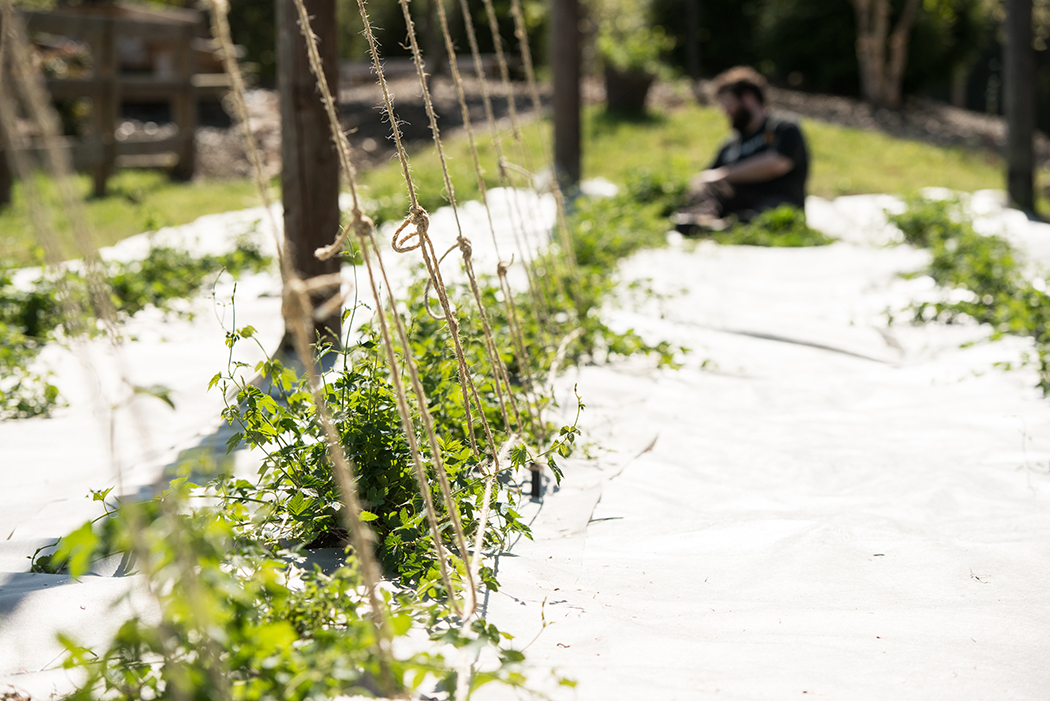The greater Charlottesville area is overflowing with beverage producers who make delicious products. But if you’re up for a scenic drive, there are additional treasures to be found not too far away. In part one of our day-trip series, we head east toward Richmond to taste Virginia-made beer, wine, spirits, and cider.
Cunningham Creek Winery, in Palmyra, is about a 30-minute drive from Charlottesville. Opened in 2016, the winery features lots of outdoor space, including a deck and picnic tables with umbrellas. Adirondack chairs are spread generously across the property, and there’s a dog park too. The winery’s pooches, Corky and Crush, are the official greeters, and make the rounds to get a look at each new visitor. The wines are high quality and it’s not surprising that the 2017 Meritage and the 2017 Estate Petit Verdot were gold medal winners in the 2020 Virginia Governor’s Cup competition.
Fifty-Third Winery and Vineyard in Louisa is another winery worth a visit. Formerly known as Cooper Vineyards, Fifty-Third got a name change in 2015 from new owners Dave and Susan Drillock, who wanted to reflect the fact that the winery was the fifty-third bonded winery in Virginia back in 1999. The Drillocks have steadily increased the quality of their wine, and winemaker Chelsey Blevins is a rising star. Their bright and high-toned albariño, a variety that is still relatively rare in the state, shows why this grape is generating increasing interest from many area winemakers.
For beer lovers, Lickinghole Creek Craft Brewery is located on a 290-acre farm in Goochland County. The brewery prides itself on small-batch releases of innovative recipes that feature ingredients that are either grown on their own farm or sourced from other nearby farms. With numerous and frequent new releases, Lickinghole has something for everyone to enjoy. I recommend the Juicy IPA Series, which features a new release every month and is currently on recipe number 25.
Fine Creek Brewing is just a bit farther away in Powhatan and is similarly a farm brewery that focuses on limited production, small-batch recipes that rotate frequently. With a deck and plenty of outdoor space, the property has 13 small cottages so guests can stay overnight. While Fine Creek offers a handful of cans and bottles for sale, most of the interest is in beers on tap, which can be purchased in growlers to take home. On a recent visit, the Kornøl Norwegian Farmhouse Ale with Juniper was an eye-opener, full of herbal and pine flavors combined with a lingering dry finish. The Helles Lager on tap was an excellent example of this classic and refreshing style that features biscuit flavors and an abrupt and slightly bitter finish.
Not far from Fine Creek Brewing, Three Crosses Distilling Co. became the first legal distillery in Powhatan County when it was founded approximately three years ago. This is truly small-batch distilling, done with one 250-gallon still and one 150-gallon still. They source as many ingredients as possible from the local area—both the corn for the moonshine and the rye for the whiskey are grown in Powhatan County. With a core list of six spirits, Three Crosses also offers limited releases every few months. One of the current options is Noble Hound Dark Rye Whiskey, which is finished in port barrels following two years of oak-barrel aging. This additional finishing step tames the spicy character of rye and results in a smooth finish. I also recommend the gin, a recipe developed in-house to highlight floral and citrus characters with a subtle juniper flavor.
Cider lovers also have something worth traveling for at Buskey Cider, located in Scott’s Addition on the west edge of Richmond. While this is the farthest destination from C’ville, the high-quality and interesting flavors are worth the trip. Launched in 2016 and using only Virginia-grown apples, Buskey features classic styles as well as more experimental recipes with added flavors. I was the first customer to taste the new Thai Tom Yum cider on tap. The subtle flavors of lemongrass, lime, and ginger, along with a whisper of chili heat, certainly made an impression.


